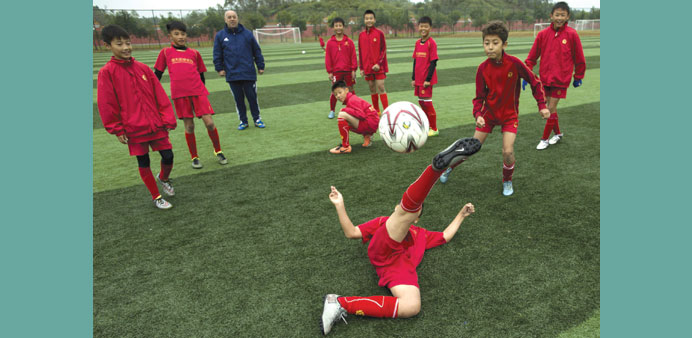A student controls the ball during a training session at Evergrande soccer academy in Qingyuan, southern China. (Reuters)
Reuters/Hong Kong/Shanghai
Wang Shijie, 11, is a rising star among the nearly 3,000 students at Guangzhou Evergrande’s huge soccer academy in south China. He wants to join the national team and help achieve President Xi Jinping’s dream of winning the World Cup.
In schools like this around the country, China is training an army of young players it hopes will help the nation shake off its lowly place in the world’s football ladder: 84th out of 209 countries, just above Qatar and below teams like Jordan, Montenegro and Gabon.
“When I join the national team, I will do my best to help China become World Cup champions,” Wang, wearing golden-coloured boots and a yellow jersey, said during a break in training at the school that has 50 full-size pitches and coaches flown in from European giant Real Madrid.
Led by Xi, an avid fan, China has clearly made it a goal to become a soccer superpower. A consortium led by state-backed China Media Capital took a $400 million stake last week in the owner of English Premier League champions Manchester City—Beijing’s biggest investment in the sport overseas.
The tie-up will help Abu Dhabi-owned City tap the fast-growing sports and entertainment market in the world’s most populous nation, and at the same time give China international soccer knowhow, on the field and off.
“The Chinese government wanted to make a statement,” said Alexander Jarvis, chairman of Blackbridge Cross Borders, which brokers deals between Chinese investors and European teams.
Jarvis said he was currently working on six deals with Chinese firms looking to buy into clubs in Europe—including in England, Germany and Spain—and that there would be even bigger Chinese investment in 2016, usually with a China-based soccer school or training base thrown in.
“Pretty much every football club which has some type of deal with the Chinese will have an academy. It’s very much Xi’s long-term dream of World Cup glory, and building the infrastructure on the ground is exactly what they want.”
Guangzhou Evergrande, coached by World Cup-winning Brazilian Luiz Felipe Scolari, are current Asian club champions but China’s national team has a long way to go to World Cup glory. Even in Asia, fierce rivals Japan and South Korea have a far stronger reputation in the game.
The only time China qualified for the finals of the World Cup was in 2002, when the tournament was jointly hosted by South Korea and Japan. China was dismissed at the group stage without scoring a goal and conceding nine.
Its hopes of qualifying for the 2018 finals have been dealt a blow after a goalless draw with tiny Hong Kong last month. There is no evidence that investing in football clubs overseas has contributed to any Asian soccer team’s prowess. Businessmen from Singapore, Malaysia, Thailand, India and China all have stakes in European clubs.
But if the investments help improve China’s soccer infrastructure, it could lead the way to a successful bid to host the World Cup finals, sports executives say. The home nation automatically qualifies for the tournament.
For the clubs, China is a huge, still untapped market for fans, merchandise sales and TV audiences. The country aims to grow its sports market to 5 trillion yuan ($782 billion) by 2025, around a five-fold leap from its current size, and football will play a big part.
That’s good news for franchises tapping into local media distribution rights, sponsorship and merchandising. It’s also a boon for sports-focused companies such as adidas AG and Nike Inc.
“The willingness to pay for sports isn’t limited to watching them; membership at sports clubs is up, as is the amount people are willing to spend on sporting equipment,” said Liu Yue, a former national football player and now a commentator.
Increasingly, the way into China’s football market is made easier by promoting the local game.
Germany’s adidas and former Brazil star Ronaldo have launched football academies and England’s David Beckham is an “ambassador” for Chinese football.
Premier League and other European clubs regularly visit China in their summer off-season, drawing huge crowds.
Chinese authorities are squarely behind the drive to develop local football, providing the vital political support to the move. Local governments have helped subsidise television licence fees to support local teams, while the recent Manchester City deal was led by a state-backed firm.
Xi himself visited City’s academy last month during a trip to Britain, where he posed for a selfie with Argentinian striker Sergio Aguero and British Prime Minister David Cameron.
However, corruption and player quality remain serious hurdles in Chinese football. A crackdown to clean up the game has seen at least nine officials, four judges, 13 footballers or coaches and 17 club workers jailed or punished since 2009.
“A short-term goal for China is to gain a leading role in Asia,” said Fernando Sanchez Cipitria, technical director at the academy in Guangdong and a former midfielder for Spain. “For China to win the World Cup it could be a long journey.”

